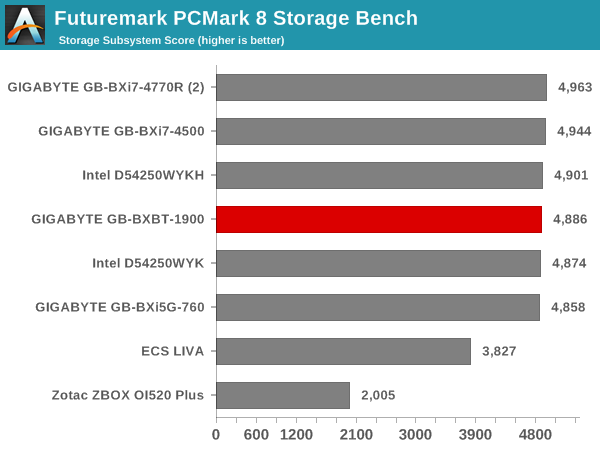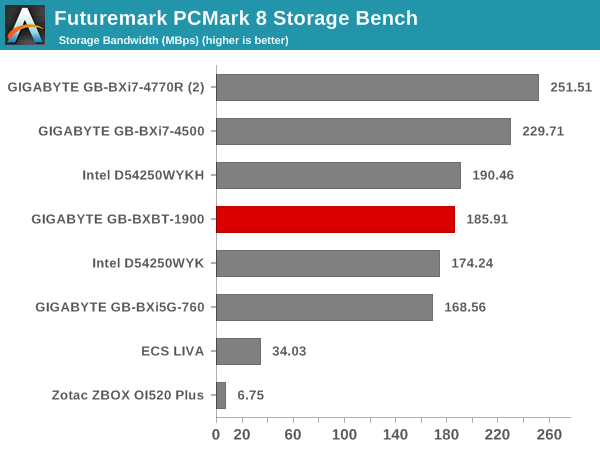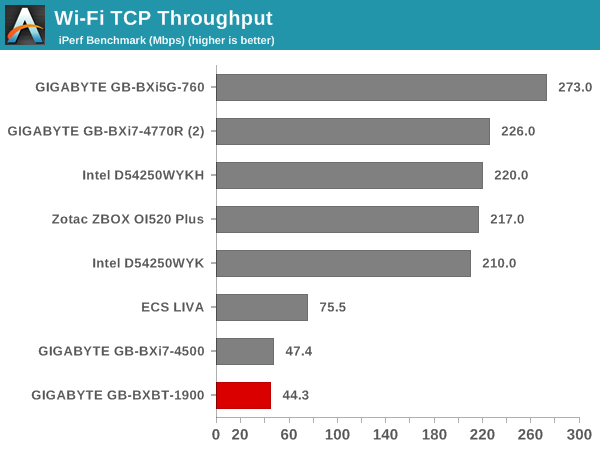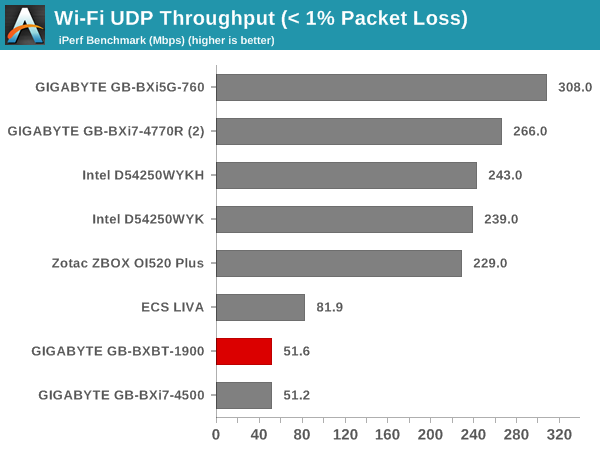GIGABYTE BRIX GB-BXBT-1900 Review: A Bay Trail UCFF PC
by Ganesh T S on October 24, 2014 12:10 PM ESTNetworking & Storage Performance
We have recently started devoting a separate section to analyze the storage and networking credentials of the units under review. On the storage side, one option would be repetition of our strenuous SSD review tests on the drive(s) in the PC. Fortunately, to avoid that overkill, PCMark 8 has a storage bench where certain common workloads such as loading games and document processing are replayed on the target drive. Results are presented in two forms, one being a benchmark number and the other, a bandwidth figure. We ran the PCMark 8 storage bench on selected PCs and the results are presented below.


The Samsung SSD 840 EVO is the same model that was used in the BRIX Pro. While there is not much to separate them in the storage subsystem score, there is quite a bit of difference in the storage bandwidth. Since the storage bandwidth workloads are real-world traces, it makes sense that the CPU can act as a bottleneck. This is the reason why we have a gap of more than 60 MBps between the two systems. Effectively speaking, pairing the Samsung SSD 840 EVO with a Celeron J1900 system will not expose the full benefits of the SSD in real-world situations. It goes without saying that the SSD does make the system more responsive by removing disk I/O bottlenecks compared to hard drives (such as the one used in the ZBOX OI520 PLUS).
On the networking side, we restricted ourselves to the evaluation of the WLAN component. Our standard test router is the Netgear R7000 Nighthawk configured with both 2.4 GHz and 5 GHz networks. The router is placed approximately 20 ft. away, separated by a drywall (as in a typical US building). A wired client (Zotac ID89-Plus) is connected to the R7000 and serves as one endpoint for iPerf evaluation. The PC under test is made to connect to either the 5 GHz (preferred) or 2.4 GHz SSID and iPerf tests are conducted for both TCP and UDP transfers. It is ensured that the PC under test is the only wireless client for the Netgear R7000. We evaluate total throughput for up to 32 simultaneous TCP connections using iPerf and present the highest number in the graph below.

In the UDP case, we try to transfer data at the highest rate possible for which we get less than 1% packet loss.

The BXBT-1900 uses the same Realtek RTL8723BE 1x1:1 802.11n / BT combo that we saw in the BXi7-4500 earlier this month. The slight differences in the throughput numbers above can be attributed to antenna placement. In any case, a single stream 802.11n card is the bare minimum that today's PCs can ship with. Given the low price target for this Bay Trail system, we believe GIGABYTE can be excused for bundling such a card.










35 Comments
View All Comments
xistic - Friday, October 24, 2014 - link
How does something like this compare to an old Intel Core Duo with 4GB of RAM? I've got a headless linux box I'm looking to replace. Currently the Core Duo is overkill for what I use it for. (Team Fortress 2 MvM, jabber, Rhodecode and Teamspeak servers all with low traffic. Seriously, never get above 20% CPU and 25% RAM consumed.)kpb321 - Friday, October 24, 2014 - link
You can see for yourself at:http://www.anandtech.com/bench/product/1227?vs=60
Single threaded performance seems to be ~half that of a Core Duo but as the J1900 is a quad core chip it's multi-threaded performance is a little bit better.
lioncat55 - Friday, October 24, 2014 - link
While I don't have any numbers that is not the right chip. You are looking at a Core 2 Duo and not a Core Due. You are also looking at a Core 2 Duo part that has a higher base clock than the J1900 has boost.A better look would be the http://www.anandtech.com/bench/product/1227?vs=64. Its bast clock is 2.4Ghz.
xistic - Friday, October 24, 2014 - link
I forgot there was a difference. It's a Core 2 Duo.xistic - Friday, October 24, 2014 - link
And thank you, this answers my question.LostAlone - Saturday, October 25, 2014 - link
Personally I wouldn't be looking to spend anything to replace a headless box unless you need more performance. I mean, I know that having a tower instead of micro-box isn't ideal, but you'd be throwing away all the benefits of having a more powerful system too, like being able to handle more traffic (say you invite a bunch of people to you TS server for a specific event) and whatever else you may possibly want to do in the future.A core 2 duo is a nice chip, and certainly would be up for doing some light media serving and transcoding duties if that's what you want to do, probably the most stressful home-server activities. Maybe that's not what you want to do right now, but having the choice to add those capabilities is great.
From my point of view moving to a system this underpowered would strictly be a downgrade. It'll cost you money to do the same exact thing you are doing now, and has none of the potential for expansion.
Ratman6161 - Sunday, October 26, 2014 - link
I don't know what they will charge for this if/when it ever comes to the US but the MSRP listed in the story is more than I paid for an Ivy Bridge i3 model a couple of years ago. Could probably get an i3 for the same or not much more and would probably be a better choice unless you needed that ability to do an internal 2.5 inch drive.zepi - Friday, October 24, 2014 - link
I'm trying to read the network performance evaluation, but i can only find that your router is 5GHz prefered, but nowhere does it state if this particular Realtek supports it or not.Often in cities 2.4GHz spectrum is totally blocked and any 5GHz is faster than 3x3 2.4GHz resticted 802.11n setup.
Ofc this is not a problem in suburbs. Basically in most places i've lived over the last few years 2.4GHz is pretty much unusable with huge packet loss and speeds down to single digit megabits due to interference from neighbours. 5GHz band is less problematic as it mostly stays inside owners walls.
Ryan Smith - Friday, October 24, 2014 - link
The Realtek radio is 2.4GHz only.ganeshts - Friday, October 24, 2014 - link
This is a 2.4 GHz only single band mPCIe card. Realtek RTL8723BEWill make a note to add single or dual band nature in the table on the first page in future articles